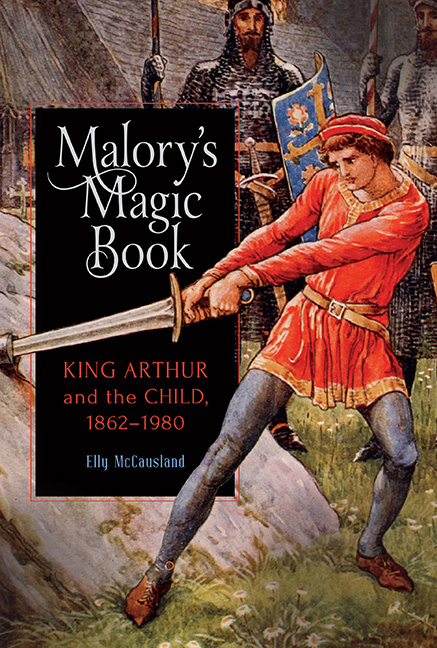Book contents
- Frontmatter
- Dedication
- Contents
- List of illustrations
- Acknowledgements
- A note on names
- Introduction
- 1 ‘Ever fresh and fascinating to the boy and girl of today’: the timeless child and the childish medieval in nineteenth-century Arthuriana
- 2 Risk and revenue: adventurous Arthurian masculinities in the work of Howard Pyle and Henry Gilbert
- 3 The ill-made adult and the mother's curse: psychoanalysing the Arthurian child in T. H. White's The Once and Future King
- 4 ‘Monty Python was not that far away’: the instability of 1950s Arthuriana for children
- 5 ‘For a little while a magician’: potent childish fantasies in John Steinbeck's Acts of King Arthur and his Noble Knights
- Conclusion: At the crossing-places
- Bibliography
- Index
- Arthurian Studies
Introduction
Published online by Cambridge University Press: 04 April 2019
- Frontmatter
- Dedication
- Contents
- List of illustrations
- Acknowledgements
- A note on names
- Introduction
- 1 ‘Ever fresh and fascinating to the boy and girl of today’: the timeless child and the childish medieval in nineteenth-century Arthuriana
- 2 Risk and revenue: adventurous Arthurian masculinities in the work of Howard Pyle and Henry Gilbert
- 3 The ill-made adult and the mother's curse: psychoanalysing the Arthurian child in T. H. White's The Once and Future King
- 4 ‘Monty Python was not that far away’: the instability of 1950s Arthuriana for children
- 5 ‘For a little while a magician’: potent childish fantasies in John Steinbeck's Acts of King Arthur and his Noble Knights
- Conclusion: At the crossing-places
- Bibliography
- Index
- Arthurian Studies
Summary
‘I hope you are not being stupid about children,’ asked Merlyn, looking vaguely about him. ‘We have high authority for being born again, like little ones. Grown-ups have developed an unpleasant habit lately, I notice, of comforting themselves for their degradation by pretending that children are childish. I trust we are free from this?’
‘Everybody knows that children are more intelligent than their parents.’
‘You and I know it, but the people who are going to read this book do not.’
Defeated by his treacherous son Mordred after the collapse of his kingdom, T. H. White's King Arthur finds himself, as part of a dreamlike afterlife, in Merlyn's cave. Here he is offered the chance to return to his childhood for an evening in order to learn a series of lessons deemed necessary by the magician and his committee of talking animals. Sceptical, Arthur declines the offer to be ‘born again, like little ones’, and is swiftly admonished by Merlyn. In this meta-textual exchange, White's narrative seems to appeal to a child audience. The assertion ‘everybody knows that children are more intelligent than their parents’ appears intended to delight a child reader, flattering his or her youthful knowledge and reversing the traditional dynamic whereby the child is at the mercy of superior adult intelligence. Merlyn suggests Arthur should feel privileged by the chance to be ‘born again’ through magic, linking the state of being a ‘little one’ not with naivety and ignorance but instead with ‘high authority’. Arthur's matter-of-fact presentation of this as a universal truth – ‘everybody knows’ – which is then qualified by Merlyn – ‘you and I know it’ – positions the child within an exclusive group. Forever misunderstood and patronised by condescending adults, the child is here liberated and placed in the privileged position of having his or her true abilities recognised by the legendary figures of King Arthur and his famous magical adviser. Somewhat paradoxically, the child's very status as marginalised and excluded places him or her among a knowledgeable elite. Yet Merlyn's warning, ‘the people who are going to read this book do not’, complicates this relationship. By identifying ‘the people who are going to read this book’ as those very adults who are ‘stupid about children’, Merlyn calls the status of the implied reader into question. Is this a text for children or adults?
- Type
- Chapter
- Information
- Malory's Magic BookKing Arthur and the Child, 1862–1980, pp. 1 - 16Publisher: Boydell & BrewerPrint publication year: 2019

